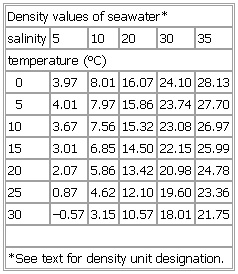Density values of seawater*
- Density values of seawater*
-
Density values of seawater*
salinity 5 10 20 30 35
temperature (°C)
0 3.97 8.01 16.07 24.10 28.13
5 4.01 7.97 15.86 23.74 27.70
10 3.67 7.56 15.32 23.08 26.97
15 3.01 6.85 14.50 22.15 25.99
20 2.07 5.86 13.42 20.98 24.78
25 0.87 4.62 12.10 19.60 23.36
30 –0.57 3.15 10.57 18.01 21.75
*See text for density unit designation.
See as table:
* * *
Universalium.
2010.
Look at other dictionaries:
Seawater — in the Strait of Malacca Seawater is water from a sea or ocean. On average, seawater in the world s oceans has a salinity of about 3.5% (35 g/L, or 599 mM). This means that every kilogram (roughly one litre by volume) of seawater has… … Wikipedia
Energy density — For energy density in the sense of energy per unit mass, see specific energy. For energy density of foods, see specific energy. Energy density is a term used for the amount of energy stored in a given system or region of space per unit volume.… … Wikipedia
rock — rock1 rockless, adj. rocklike, adj. /rok/, n. 1. a large mass of stone forming a hill, cliff, promontory, or the like. 2. Geol. a. mineral matter of variable composition, consolidated or unconsolidated, assembled in masses or considerable… … Universalium
Rock — /rok/, n. a male given name. * * * I In geology, a naturally occurring and coherent aggregate of minerals. The three major classes of rock igneous, sedimentary, and metamorphic are based on the processes that formed them. These three classes are… … Universalium
Properties of water — H2O and HOH redirect here. For other uses, see H2O (disambiguation) and HOH (disambiguation). This article is about the physical and chemical properties of pure water. For general discussion and its distribution and importance in life, see Water … Wikipedia
chemical element — Introduction also called element, any substance that cannot be decomposed into simpler substances by ordinary chemical processes. Elements are the fundamental materials of which all matter is composed. This article considers the… … Universalium
hydrologic sciences — Introduction the fields of study concerned with the waters of the Earth. Included are the sciences of hydrology, oceanography, limnology, and glaciology. In its widest sense hydrology encompasses the study of the occurrence, the… … Universalium
river — river1 riverless, adj. riverlike, adj. /riv euhr/, n. 1. a natural stream of water of fairly large size flowing in a definite course or channel or series of diverging and converging channels. 2. a similar stream of something other than water: a… … Universalium
Earth Sciences — ▪ 2009 Introduction Geology and Geochemistry The theme of the 33rd International Geological Congress, which was held in Norway in August 2008, was “Earth System Science: Foundation for Sustainable Development.” It was attended by nearly… … Universalium
liquid — liquidly, adv. liquidness, n. /lik wid/, adj. 1. composed of molecules that move freely among themselves but do not tend to separate like those of gases; neither gaseous nor solid. 2. of, pertaining to, or consisting of liquids: a liquid diet. 3 … Universalium

